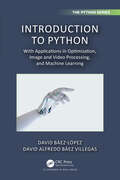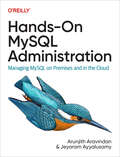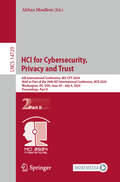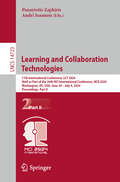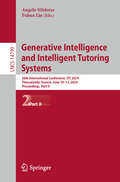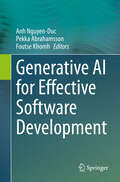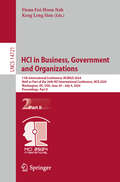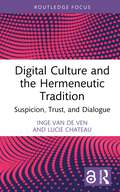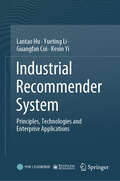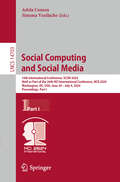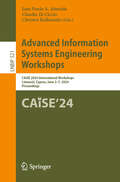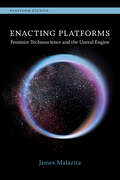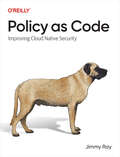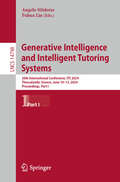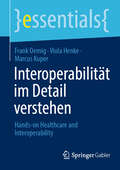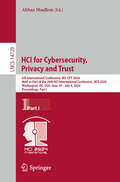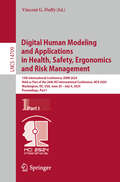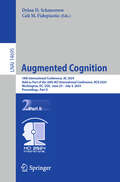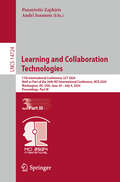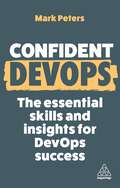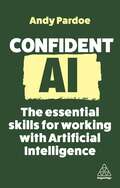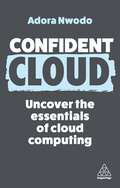- Table View
- List View
Introduction to Python: With Applications in Optimization, Image and Video Processing, and Machine Learning (Chapman & Hall/CRC The Python Series)
by David Báez-López David Alfredo Báez VillegasIntroduction to Python: with Applications in Optimization, Image and Video Processing, and Machine Learning is intended primarily for advanced undergraduate and graduate students in quantitative sciences such as mathematics, computer science, and engineering. In addition to this, the book is written in such a way that it can also serve as a self-contained handbook for professionals working in quantitative fields including finance, IT, and many other industries where programming is a useful or essential tool.The book is written to be accessible and useful to those with no prior experience of Python, but those who are somewhat more adept will also benefit from the more advanced material that comes later in the book.Features Covers introductory and advanced material. Advanced material includes lists, dictionaries, tuples, arrays, plotting using Matplotlib, object-oriented programming Suitable as a textbook for advanced undergraduates or postgraduates, or as a reference for researchers and professionals Solutions manual, code, and additional examples are available for download
Hands-On MySQL Administration
by Arunjith Aravindan Jeyaram AyyalusamyGeared to intermediate- to advanced-level DBAs and IT professionals looking to enhance their MySQL skills, this guide provides a comprehensive overview on how to manage and optimize MySQL databases. You'll learn how to create databases and implement backup and recovery, security configurations, high availability, scaling techniques, and performance tuning. Using practical techniques, tips, and real-world examples, authors Arunjith Aravindan and Jeyaram Ayyalusamy show you how to deploy and manage MySQL, Amazon RDS, Amazon Aurora, and Azure MySQL. By the end of the book, you'll have the knowledge and skills necessary to administer, manage, and optimize MySQL databases effectively. Design and implement a scalable and reliable database infrastructure using MySQL 8 on premises and cloudInstall and configure software, manage user accounts, and optimize database performanceUse backup and recovery strategies, security measures, and high availability solutionsApply best practices for database schema design, indexing strategies, and replication techniquesImplement advanced database features and techniques such as replication, clustering, load balancing, and high availabilityTroubleshoot common issues and errors, using diagnostic tools and techniques to identify and resolve problems quickly and efficientlyFacilitate major MySQL upgrades including MySQL 5.7 to MySQL 8
HCI for Cybersecurity, Privacy and Trust: 6th International Conference, HCI-CPT 2024, Held as Part of the 26th HCI International Conference, HCII 2024, Washington, DC, USA, June 29–July 4, 2024, Proceedings, Part II (Lecture Notes in Computer Science #14729)
by Abbas MoallemThis proceedings, HCI-CPT 2024, constitutes the refereed proceedings of the 6th International Conference on Cybersecurity, Privacy and Trust, held as Part of the 26th International Conference, HCI International 2024, which took place from June 29 - July 4, 2024 in Washington DC, USA. Two volumes of the HCII 2024 proceedings are dedicated to this year’s edition of the HCI-CPT Conference. The first focuses on topics related to Cyber Hygiene, User Behavior and Security Awareness, and User Privacy and Security Acceptance. The second focuses on topics related to Cybersecurity Education and Training, and Threat Assessment and Protection.
Learning and Collaboration Technologies: 11th International Conference, LCT 2024, Held as Part of the 26th HCI International Conference, HCII 2024, Washington, DC, USA, June 29–July 4, 2024, Proceedings, Part II (Lecture Notes in Computer Science #14723)
by Panayiotis Zaphiris Andri IoannouThis three-volume set LNCS 14722-14724 constitutes the thoroughly refereed proceedings of the 11th International Conference, LCT 2024, held as part of the 26th International Conference on Human-Computer Interaction, HCI International 2024 (HCII 2024), was held as a hybrid event in Washington DC, USA, during June/July 2024. The total of 1271 papers and 309 posters included in the HCII 2023 proceedings was carefully reviewed and selected from 5108 submissions. The LCT 2024 conference addresses theoretical foundations, design, and implementation, as well as effectiveness and impact issues related to interactive technologies for learning and collaboration, including design methodologies, developments and tools, theoretical models, learning design or learning experience (LX) design, as well as technology adoption and use in formal, non-formal and informal educational contexts.
Generative Intelligence and Intelligent Tutoring Systems: 20th International Conference, ITS 2024, Thessaloniki, Greece, June 10–13, 2024, Proceedings, Part II (Lecture Notes in Computer Science #14799)
by Angelo Sifaleras Fuhua LinThis book constitutes the refereed proceedings of the 20th International Conference on Generative Intelligence and Intelligent Tutoring Systems, ITS 2024, held in Thessaloniki, Greece, during June 10–13, 2024. The 35 full papers and 28 short papers included in this book were carefully reviewed and selected from 88 submissions. This book also contains 2 invited talks. They were organized in topical sections as follows: Generative Intelligence and Tutoring Systems; Generative Intelligence and Healthcare Informatics; Human Interaction, Games and Virtual Reality; Neural Networks and Data Mining; Generative Intelligence and Metaverse; Security, Privacy and Ethics in Generative Intelligence; and Generative Intelligence for Applied Natural Language Processing.
Generative AI for Effective Software Development
by Pekka Abrahamsson Anh Nguyen-Duc Foutse KhomhThis book provides a comprehensive, empirically grounded exploration of how Generative AI is reshaping the landscape of software development. It emphasizes the empirical evaluation of Generative AI tools in real-world scenarios, offering insights into their practical efficacy, limitations, and impact. By presenting case studies, surveys, and interviews from various software development contexts, the book offers a global perspective on the integration of Generative AI, highlighting how these advanced tools are adapted to and influence diverse cultural, organizational, and technological environments. This book is structured to provide a comprehensive understanding of Generative AI and its transformative impact on the field of software engineering. The book is divided into five parts, each focusing on different aspects of Generative AI in software development. As an introduction, Part 1 presents the fundamentals of Generative AI adoption. Part 2 is a collection of empirical studies and delves into the practical aspects of integrating Generative AI tools in software engineering, with a focus on patterns, methodologies, and comparative analyses. Next, Part 3 presents case studies that showcase the application and impact of Generative AI in various software development contexts. Part 4 then examines how Generative AI is reshaping software engineering processes, from collaboration and workflow to management and agile development. Finally, Part 5 looks towards the future, exploring emerging trends, future directions, and the role of education in the context of Generative AI. The book offers diverse perspectives as it compiles research and experiences from various countries and software development environments. It also offers non-technical discussions about Generative AI in management, teamwork, business and education. This way, it is intended for both researchers in software engineering and for professionals in industry who want to learn about the impactof Generative AI on software development.
HCI in Business, Government and Organizations: 11th International Conference, HCIBGO 2024, Held as Part of the 26th HCI International Conference, HCII 2024, Washington, DC, USA, June 29 – July 4, 2024, Proceedings, Part II (Lecture Notes in Computer Science #14721)
by Fiona Fui-Hoon Nah Keng Leng SiauThis two-volume set of HCIBGO 2024 constitutes the refereed proceedings of the 11h International Conference on HCI in Business, Government and Organizations, held as part of the 26th International Conference, HCI International 2024, which took place in from June 29 - July 4, 2024 in Washington DC, USA. Two volumes of the HCII 2024 proceedings are dedicated to this year’s edition of the HCIBGO conference. The first covers topics related to Digital Commerce and Marketing, Artificial Intelligence in Business, and Workplace, Well-being and Productivity. The second focuses on topics related to Teleworking and Virtual Collaboration, and Improving User Experience and Service Efficiency.
AP Computer Science A Premium, 12th Edition: Prep Book with 6 Practice Tests + Comprehensive Review + Online Practice (Barron's AP Prep)
by Roselyn Teukolsky M.S.Be prepared for exam day with Barron&’s. Trusted content from AP experts!Barron&’s AP Computer Science A Premium, 12th Edition includes in‑depth content review and practice. It&’s the only book you&’ll need to be prepared for exam day. Written by Experienced EducatorsLearn from Barron&’s‑‑all content is written and reviewed by AP expertsBuild your understanding with comprehensive review tailored to the most recent examGet a leg up with tips, strategies, and study advice for exam day‑‑it&’s like having a trusted tutor by your sideBe Confident on Exam DaySharpen your test‑taking skills with 6 full‑length practice tests–3 in the book, including a diagnostic test to target your studying, and 3 more online–plus detailed answer explanations for all questionsStrengthen your knowledge with in‑depth review covering all units on the AP Computer Science A examReinforce your learning with dozens of clear examples and a series of multiple‑choice practice questions at the end of each review chapterLearn the key techniques and methods of modern programming with a chapter devoted to the Java language features you need to know for test dayRobust Online PracticeContinue your practice with 3 full‑length practice tests on Barron&’s Online Learning HubSimulate the exam experience with a timed test optionDeepen your understanding with detailed answer explanations and expert adviceGain confidence with scoring to check your learning progress
Digital Culture and the Hermeneutic Tradition: Suspicion, Trust, and Dialogue (Routledge Focus on Literature)
by Inge van de Ven Lucie ChateauIn our information age, deciding what sources and voices to trust is a pressing matter. There seems to be a surplus of both trust and distrust in and on platforms, both of which often amount to having your mindset remain the same. Can we move beyond this dichotomy toward new forms of intersubjective dialogue? This book revaluates the hermeneutic tradition for the digital context. Today, hermeneutics has migrated from a range of academic approaches into a plethora of practices in digital culture at large. We propose a ‘scaled reading’ of such practices: a reconfiguration of the hermeneutic circle, using different tools and techniques of reading. We demonstrate our digital-hermeneutic approach through case studies including toxic depression memes, the Johnny Depp/Amber Heard trial, and r/changemyview. We cover three dimensions of hermeneutic practice: suspicion, trust, and dialogue. This book is essential reading for (under)graduate students in digital humanities and literary studies.
Industrial Recommender System: Principles, Technologies and Enterprise Applications
by Lantao Hu Yueting Li Guangfan Cui Kexin YiRecommender systems, as a highly popular AI technology in recent years, have been widely applied across various industries. They have transformed the way we interact with technology, influencing our choices and shaping our experiences. This book provides a comprehensive introduction to industrial recommender systems, starting with the overview of the technical framework, gradually delving into each core module such as content understanding, user profiling, recall, ranking, re-ranking and so on, and introducing the key technologies and practices in enterprises. The book also addresses common challenges in recommendation cold start, recommendation bias and debiasing. Additionally, it introduces advanced technologies in the field, such as reinforcement learning, causal inference. Professionals working in the fields of recommender systems, computational advertising, and search will find this book valuable. It is also suitable for undergraduate, graduate, and doctoral students majoring in artificial intelligence, computer science, software engineering, and related disciplines. Furthermore, it caters to readers with an interest in recommender systems, providing them with an understanding of the foundational framework, insights into core technologies, and advancements in industrial recommender systems. The translation was done with the help of artificial intelligence. A subsequent human revision was done primarily in terms of content.
Social Computing and Social Media: 16th International Conference, SCSM 2024, Held as Part of the 26th HCI International Conference, HCII 2024, Washington, DC, USA, June 29–July 4, 2024, Proceedings, Part I (Lecture Notes in Computer Science #14703)
by Adela Coman Simona VasilacheThis book constitutes the refereed proceedings of the 16th International Conference on Social Computing and Social Media, SCSM 2024, held as part of the 26th HCI International Conference, HCII 2024, which took place in Washington, DC, USA, during June 29–July 4, 2024. The total of 1271 papers and 309 posters included in the HCII 2024 proceedings was carefully reviewed and selected from 5108 submissions. The SCSM 2024 proceedings were organized in the following topical sections: Part I: Designing, developing and evaluating social media; user experience and user behavior in social media; AI and language models in social media; Part II: Social media in learning, education and culture; social media in business and ecommerce; Part III: Computer-mediated communication; social media for community, society and democracy.
Advanced Information Systems Engineering Workshops: CAiSE 2024 International Workshops, Limassol, Cyprus, June 3–7, 2024, Proceedings (Lecture Notes in Business Information Processing #521)
by Christos Kalloniatis Claudio Di Ciccio João Paulo A. AlmeidaThis book constitutes the thoroughly refereed proceedings of the international workshops associated with the 36th International Conference on Advanced Information Systems Engineering, CAiSE 2024, which was held in Limassol, Cyprus, during June 2024. The total of 25 full and 5 short papers included in these proceedings were carefully reviewed and selected from 60 submissions. They stem from the following workshops: – International Workshop on Blockchain for Information Systems (BC4IS24) and Blockchain for Trusted Data Sharing (B4TDS); – 2nd International Workshop on Hybrid Artificial Intelligence and Enterprise Modelling for Intelligent Information Systems (HybridAIMS); – 2nd International Workshop on Knowledge Graphs for Semantics-driven Systems Engineering (KG4SDSE); – 16th International Workshop on Enterprise & Organizational Modeling and Simulation (EOMAS); – International Workshop on Digital Transformation with Business Process Mining (DigPro).
Enacting Platforms: Feminist Technoscience and the Unreal Engine (Platform Studies)
by James MalazitaAn analysis of the game engine Unreal through feminist, race, and queer theories of technology and media, as well as a critique of the platform studies framework itself.In this first scholarly book on the Unreal game engine, James Malazita explores one of the major contemporary game development platforms through feminist, race, and queer theories of technology and media, revealing how Unreal produces, and is produced by, broader intersections of power. Enacting Platforms takes a novel critical platform studies approach, raising deeper questions: what are the material and cultural limits of platforms themselves? What is the relationship between the analyst and the platform of study, and how does that relationship in part determine what &“counts&” as the platform itself? Malazita also offers a forward-looking critique of the platform studies framework itself.The Unreal platform serves as a kind of technical and political archive of the games industry, highlighting how the techniques and concerns of games have shifted and accreted over the past 30 years. Today, Unreal is also used in contexts far beyond games, including in public communication, biomedical research, civil engineering, and military simulation and training. The author&’s depth of technical analysis, combined with new archival findings, contributes to discussions of topics rarely covered in games studies (such as the politics of graphical rendering algorithms), as well as new readings of previously &“closed&” case studies (such as the engine&’s entanglement with the US military and American masculinity in America&’s Army). Culture, Malazita writes, is not &“built into&” software but emerges through human practices with code.
Policy as Code
by Jimmy RayIn today's cloud native world, where we automate as much as possible, everything is code. With this practical guide, you'll learn how Policy as Code (PaC) provides the means to manage the policies, related data, and responses to events that occur within the systems we maintain—Kubernetes, cloud security, software supply chain security, infrastructure as code, and microservices authorization, among others.Author Jimmy Ray provides a practical approach to integrating PaC solutions into your systems, with plenty of real-world examples and important hands-on guidance. DevOps and DevSecOps engineers, Kubernetes developers, and cloud engineers will understand how to choose and then implement the most appropriate solutions.Understand PaC theory, best practices, and use cases for securityLearn how to choose and use the correct PaC solution for your needsExplore PaC tooling and deployment options for writing and managing PaC policiesApply PaC to DevOps, IaC, Kubernetes, and AuthN/AuthZExamine how you can use PaC to implement security controlsVerify that your PaC solution is providing the desired resultCreate auditable artifacts to satisfy internal and external regulatory requirements
Generative Intelligence and Intelligent Tutoring Systems: 20th International Conference, ITS 2024, Thessaloniki, Greece, June 10–13, 2024, Proceedings, Part I (Lecture Notes in Computer Science #14798)
by Angelo Sifaleras Fuhua LinThis book constitutes the refereed proceedings of the 20th International Conference on Generative Intelligence and Intelligent Tutoring Systems, ITS 2024, held in Thessaloniki, Greece, during June 10–13, 2024. The 35 full papers and 28 short papers included in this book were carefully reviewed and selected from 88 submissions. This book also contains 2 invited talks. They were organized in topical sections as follows: Generative Intelligence and Tutoring Systems; Generative Intelligence and Healthcare Informatics; Human Interaction, Games and Virtual Reality; Neural Networks and Data Mining; Generative Intelligence and Metaverse; Security, Privacy and Ethics in Generative Intelligence; and Generative Intelligence for Applied Natural Language Processing.
Interoperabilität im Detail verstehen: Hands-on Healthcare & Interoperability (essentials)
by Frank Oemig Viola Henke Marcus KuperDieses essential bietet einen Einstieg in die Fragestellung, was mit dem Begriff „Interoperabilität“ gemeint ist, der nicht nur den Datenaustausch zwischen IT-Systemen im Gesundheitswesen beschreibt. Dazu werden die in diesem Kontext häufig gebrauchten Begriffe wie Kompatibilität oder Konformität erläutert und in einen Zusammenhang gebracht. Weiterhin wird aufgezeigt, dass Interoperabilität das Ergebnis eines längeren Arbeits- und Austauschprozesses ist und wie „Interoperabilität“ für den erfolgreichen und reibungslosen Einsatz im Gesundheitssystem gemeinsam mit allen Stakeholdern weiterentwickelt werden kann.
HCI for Cybersecurity, Privacy and Trust: 6th International Conference, HCI-CPT 2024, Held as Part of the 26th HCI International Conference, HCII 2024, Washington, DC, USA, June 29 – July 4, 2024, Proceedings, Part I (Lecture Notes in Computer Science #14728)
by Abbas MoallemThis proceedings, HCI-CPT 2024, constitutes the refereed proceedings of the 6th International Conference on Cybersecurity, Privacy and Trust, held as Part of the 26th International Conference, HCI International 2024, which took place from June 29 - July 4, 2024 in Washington DC, USA. Two volumes of the HCII 2024 proceedings are dedicated to this year’s edition of the HCI-CPT Conference. The first focuses on topics related to Cyber Hygiene, User Behavior and Security Awareness, and User Privacy and Security Acceptance. The second focuses on topics related to Cybersecurity Education and Training, and Threat Assessment and Protection.
Proceedings of the 7th International Conference on Geotechnics, Civil Engineering and Structures, CIGOS 2024, 4-5 April, Ho Chi Minh City, Vietnam: Advances in Planning, Architecture and Construction for Sustainable Development (Lecture Notes in Civil Engineering #482)
by Cuong Ha-Minh Dat Vu Khoa Huynh Cao Hung Pham Hanh T. H. VuThis book includes peer-reviewed articles from the 7th International Conference on Geotechnics, Civil Engineering and Structures (CIGOS 2024) held on April 4-5 in Ho Chi Minh City, Vietnam. It highlights recent advances in planning, architecture, and construction for sustainable development. The book features a compilation of articles presented at the conference, bringing together researchers, academics, and practitioners from around the world. The topics covered range from Planning, Architecture, and Industrial Design to Construction, Materials, Structures, and Digital Technologies, as well as Geoscience, Environment, and Energy, and Transportation, Infrastructure, Management, and Investment. The book emphasizes the importance of a multidisciplinary approach to sustainable development in order to address environmental, social, and economic challenges faced by societies worldwide. It provides insights into best practices and innovative approaches for achieving sustainabledevelopment goals, such as reducing the carbon footprint, enhancing energy efficiency, promoting the use of eco-friendly materials, and implementing sustainable construction techniques. Overall, this book offers valuable knowledge and advice to professionals, researchers, and policymakers engaged in sustainable development initiatives.
Digital Human Modeling and Applications in Health, Safety, Ergonomics and Risk Management: 15th International Conference, DHM 2024, Held as Part of the 26th HCI International Conference, HCII 2024, Washington, DC, USA, June 29–July 4, 2024, Proceedings, Part I (Lecture Notes in Computer Science #14709)
by Vincent G. DuffyThis three-volume set LNCS 14709-14711 constitutes the refereed proceedings of the 15th International Conference on Digital Human Modeling and Applications in Health, Safety, Ergonomics and Risk Management, DHM 2024, held as part of the 26th International Conference, HCI International 2024, in Washington, DC, USA, during June 29 – July 4, 2024. The total of 1271 papers and 309 posters included in the HCII 2024 proceedings was carefully reviewed and selected from 5108 submissions. DHM 2024 method focuses on: Part I: Digital Human Modeling for Design and Evaluation; User Experience and Assistive Technologies; User Experience, Communication, and Collaboration. Part II: Healthcare Design and Support; Technology in Mental Health and Wellbeing; Artificial Intelligence and Health Applications. Part III: Work, Safety, and Ergonomics; Ergonomics, Artificial Intelligence and Smart Technologies, Advanced Technologies for Training and Learning.
Augmented Cognition: 18th International Conference, AC 2024, Held as Part of the 26th HCI International Conference, HCII 2024, Washington, DC, USA, June 29–July 4, 2024, Proceedings, Part II (Lecture Notes in Computer Science #14695)
by Dylan D. Schmorrow Cali M. FidopiastisThis book constitutes the refereed proceedings of the 18th International Conference on Augmented Cognition, AC 2024, held as part of the 26th HCI International Conference, HCII 2024, which took place in Washington, DC, USA, during June 29–July 4, 2024. The total of 1271 papers and 309 posters included in the HCII 2024 proceedings was carefully reviewed and selected from 5108 submissions. The AC 2024 proceedings were organized in the following topical sections: Part I: Understanding cognitive processes and human performance; advancing cognitive abilities and performance with augmented tools; Part II: Advances in augmented cognition technologies; applications of augmented cognition in various contexts.
Learning and Collaboration Technologies: 11th International Conference, LCT 2024, Held as Part of the 26th HCI International Conference, HCII 2024, Washington, DC, USA, June 29–July 4, 2024, Proceedings, Part III (Lecture Notes in Computer Science #14724)
by Panayiotis Zaphiris Andri IoannouThis three-volume set LNCS 14722-14724 constitutes the thoroughly refereed proceedings of the 11th International Conference, LCT 2024, held as part of the 26th International Conference on Human-Computer Interaction, HCI International 2024 (HCII 2024), was held as a hybrid event in Washington DC, USA, during June/July 2024. The total of 1271 papers and 309 posters included in the HCII 2023 proceedings was carefully reviewed and selected from 5108 submissions. The LCT 2024 conference addresses theoretical foundations, design, and implementation, as well as effectiveness and impact issues related to interactive technologies for learning and collaboration, including design methodologies, developments and tools, theoretical models, learning design or learning experience (LX) design, as well as technology adoption and use in formal, non-formal and informal educational contexts.
Using the Internet for Virtual School: Rules and Tips for a Successful Online Learning Experience (Emotional Education for Elementary Schoolers)
by Dagmar GeislerFrom award-winning author Dagmar Geisler, in collaboration with illustrator Nikolai Renger, a new series for elementary school students about social-emotional learning and physical and mental health. In recent years, children of all ages—just like many adults!—from all over the world have had to shift the way they learn and work. They&’ve adapted to sitting in front of their computers or tablets instead of in a physical class with their peers. Some have thrived in this environment, while others struggle to prepare themselves for the virtual learning experience. In Using the Internet for Virtual School, best friends Madison and Luke quickly learn all about what can go wrong if they&’re not prepared for their virtual lessons when Luke&’s older brother, Tim, experiences a stressful online presentation. The laptop dies, his video files won&’t load, and possibly worst of all, he didn&’t realize an embarrassing (babyish!) poster was hanging on the wall behind him the whole time! This sours Tim&’s mood for the foreseeable future, and Madison and Luke decide to make a list of the Do&’s and Don&’ts of virtual school and presentations so they don&’t replicate Tim&’s disaster of a day when it comes time for them to join their class online. In this timely book, award-winning author Dagmar Geisler presents tips and tricks—as well as some golden rules—to help primary school students prepare for their digital lessons and presentations. This is a strong conversation-starter for adults and children and is also a practical guide.
Confident DevOps: The Essential Skills and Insights for DevOps Success (Confident Series #18)
by Mark PetersThe global DevOps market is valued at over $8 billion. But this vital sector remains complex and intimidating for many. Unlock your full potential and uncover the key insights with Confident DevOps. DevOps is defined by the practices, methodologies and tools which are necessary for any software development endeavour to succeed. It is a unique and fascinating discipline, which requires technical expertise, managerial skills and strong communication skills.Confident DevOps guides you through the entire software development lifecycle. offering insights on key topics including system architecture and cyber security. With fascinating insights on the various career paths and opportunities, this book offers the practical skills, knowledge and confidence you need to develop your DevOps expertise and pursue a successful career.About the Confident series...From coding and data science to cloud and cyber security, the Confident books are perfect for building your technical knowledge and enhancing your professional career.
Confident AI: The Essential Skills for Working With Artificial Intelligence (Confident Series #16)
by Andy PardoeDiscover new skills, expand your knowledge and build your confidence through this fascinating and accessible guide to working with AI.Artificial intelligence has become an integral part of our everyday lives. But it remains an elusive, complex and intimidating technology that has hundreds of iterations and nuances. With Confident AI, build your confidence when working with AI by learning the fundamentals and discovering the intricacies of the industry.Andy Pardoe has spent decades working with AI, not only as an influential academic but also within corporations and as a consultant and accelerator for AI start-ups. He draws upon his expertise and lived experience to offer the essential skills and tools that you need to succeed with Artificial Intelligence, whether you are pursuing it as a career or simply working with AI in your work-life.About the Confident series...From coding and data science to cloud and cybersecurity, the Confident books are perfect for building your technical knowledge and enhancing your professional career.
Confident Cloud: Uncover the Essentials of Cloud Computing (Confident Series #17)
by Adora Nwodo94% of all enterprises depend upon cloud services. Gain the edge in your career with this essential guide to the fundamental concepts and platforms of cloud computing.Cloud computing is part of our everyday lives, from cloud backups of personal data to cloud platforms powering businesses around the world. But do you really understand how cloud computing works? This comprehensive guide demystifies key concepts and gives you the confidence you need to succeed in this sector.Confident Cloud includes key concepts from FinOps and DevOps to Kubernets and automation. This is supported by practical guidance on working in the industry, alongside a variety of fascinating case studies, clarifying how cloud infrastructure is effectively deployed and maintained.About the Confident series...From coding and data science to cloud and cybersecurity, the Confident books are perfect for building your technical knowledge and enhancing your professional career.
